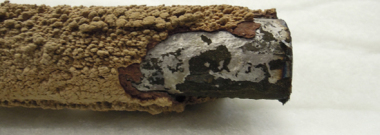03X3589

| Laufzeit: | 01.11.2013 - 30.04.2017 |
|---|---|
| Geldgeber: | Bundesministerium für Bildung und Forschung (BMBF) |
| Bearbeiter: | Ludmila Krumm |
| Arbeitsgruppe: | Hochtemperaturwerkstoffe |
Waste-to-energy (WTE) plants offer a possibility of municipal waste disposal with the additional benefit of energy generation. Unfortunately the combustion gas contains aggressive species, which leads to fast corrosion on important components such as superheater tubes in boilers. Most critical species of the process gas are alkaline chlorides and HCl, which can form molten salts or volatile corrosion products, respectively.
Damages in boilers caused by high temperature corrosion account for 500,000 Euros per year and plant due to high material wastage and downtime. Additionally incinerators are run below their possible efficiency in order to increase service life of the superheaters. For an average plant this fact leads to further yearly costs amounting to 750,000 €. The total economic loss of 200 incineration plants in Germany accounts for 250 million Euros per year.
Chlorine-induced high temperature corrosion has been investigated since the early 1990s, but the underlying corrosion kinetics and mechanisms especially in complex atmospheres are still under debate.
The goal of the VOKos project is to finally elucidate the mechanism and kinetics of chloride corrosion under high temperature conditions such as those in WTE boilers. For this purpose the operating condition used in plants will be simulated in the laboratory in order to study the corrosion process systematically. Furthermore the impact of corrosive particles on high temperature corrosion will be investigated. Based on the results a corrosion model will be developed which can be used to predict the lifetime of the critical components in boilers.
zurückPD Dr. Mathias Galetz
Tel.: 06172 89938-993
E-Mail: mathias.galetz
L. Krumm, M.C. Galetz, Materials and Corrosion (2019)
L. Krumm, M.C. Galetz, Oxidation of Metals 90 (2018), 365
L. Krumm, M.C. Galetz, Oxidation of Metals 87 (2017), 757